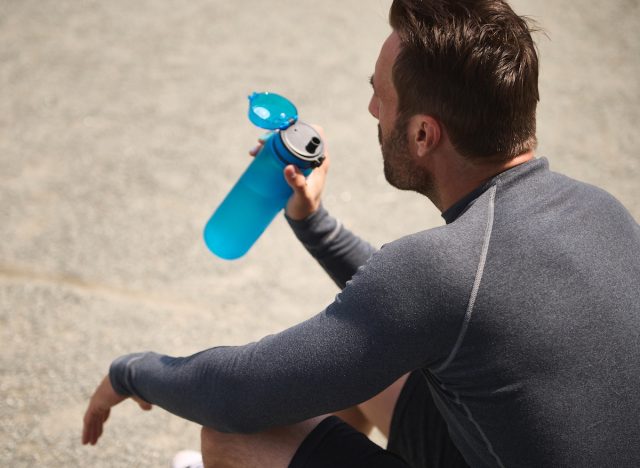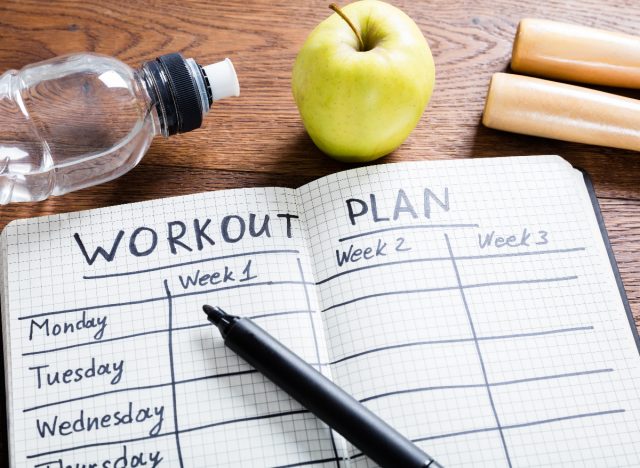8 Habits That Destroy Your Workout Before You Begin

Embarking on a workout routine is an exciting step toward better health and fitness. However, certain habits can sabotage your efforts before you even begin. These habits can hinder your progress, diminish your motivation, and prevent you from reaping the full benefits of your workouts. To learn more, we chatted with Jarrod Nobbe, CPT, a certified personal trainer with Garage Gym Reviews, to explore eight common habits that can potentially destroy your workout.
Many of us are guilty of the following habits that can wreck your energy levels, performance, and overall workout experience. Fortunately, by understanding and addressing these destructive habits, you can adjust accordingly to optimize your workout routine and maximize results.
Read on to learn which bad fitness habits may be causing you to self-sabotage your progress and how to replace them with positive behaviors to enhance your performance, increase your stamina, and achieve your fitness goals more effectively. Then, check out the 7 Fitness Habits That Are Destroying Your Body After 60.
Not prioritizing nutrition

Proper nutrition is essential for fueling your workouts and achieving your fitness goals. Failing to prioritize nutrition can make you feel sluggish, low on energy, and unable to perform your best. Ensure you're consuming a well-balanced diet that includes a mixture of carbohydrates, protein, and healthy fats to support your fitness goals.
"Proper nutrition enhances your energy levels, boosts strength, promotes recovery, and helps your body function properly," states Nobbe. "Not eating, or not eating the right things, before training can be detrimental. Look to have a meal two to three hours before, followed by a light snack one hour prior. Focus on easily digested foods, including lean protein, simple carbohydrates, and low-fat options."
Not staying hydrated

Hydration is critical to maintaining optimal performance during workouts. That's because dehydration can lead to decreased energy levels, muscle cramps, and impaired cognitive function. Therefore, make it a habit to drink water before, during, and after your workouts to stay hydrated and get the most out of your workouts.
"Not hydrating can lead to a lack of recovery, lower energy levels, and more strain on the body," cautions Nobbe. "Consuming the right kind and adequate fluids helps electrolyte balance and allows the body to perform well. Fluids need to be consumed before, during, and after training."
Not having a plan

Approaching your workouts without a game plan can lead to aimless wandering around the gym or performing exercises without purpose. Instead, Nobbe advises planning your workouts to help you stay focused, track progress, and effectively target all muscle groups.
"An exercise program enables you to navigate the weight room and organize the daily workout in a beneficial way (power, strength, accessories, and conditioning). A workout routine also takes one more task off your plate that you no longer have to figure out," says Nobbe.
Not prioritizing recovery

Recovery is just as essential to success in the gym as the workout itself. Ignoring the need for proper recovery can result in overtraining syndrome, which includes symptoms like muscle fatigue, increased injury risk, and hindered progress. Instead, incorporate rest days into your routine, get plenty of quality sleep, and engage in activities that promote relaxation and rejuvenation, such as stretching or foam rolling.
"Ensure you make time for mobility after a workout, whether stretching or foam rolling. In addition, hydration and nutrition are essential to ensure your fuel levels are ready for tomorrow's session," advises Nobbe. "I recommend taking five to 10 minutes close to bedtime, working on breathing techniques, and running through a mobility session. These can help promote better sleep and, in turn, better recovery."
Not managing your time effectively

Time management plays a crucial role in maintaining a consistent workout routine. If you frequently rush through workouts or skip them altogether due to a lack of time, consider reassessing your schedule to prioritize exercise. Nobbe recommends planning your day accordingly, carving out dedicated fitness time, and eliminating unnecessary distractions.
"A great workout doesn't have to be hours spent in the gym daily. There are excellent, quicker workout options available. The key is making time for exercise and movement. Start by blocking off time for a workout or movement breaks on your calendar," says Nobbe.
Lacking motivation

Whether it's setting realistic goals, finding an exercise buddy, or rewarding yourself for reaching milestones, finding ways to stay motivated is essential for success.
"Just as a workout plan directs us toward what movements we will perform, goal setting and motivation provide our 'why.' Goals need to be attainable, purposeful, and revised occasionally," Nobbe says, advising setting SMART goals—smart, measurable, achievable, realistic, and timely.
Not being consistent

Like anything else worthwhile in life, consistency is vital to achieving long-term fitness results. That's because irregular workout patterns can impede progress and make it difficult to see tangible improvements. Therefore, commit to a regular exercise schedule that suits your lifestyle, and stick to it. Even when motivation is low, remind yourself of the long-term benefits and push through.
"Consistency yields progress, progress creates motivation, and motivation leads to action," states Nobbe.
Being on your phone at the gym

Using your phone excessively at the gym can be a significant distraction that disrupts your focus and intensity. Avoid checking social media or responding to messages while working out. Instead, stay present, maintain proper form, and make the most out of your workout time.
"These distractions lower your effort levels and focus, making the short workouts seem long. Take the time when you're working out yourself to focus on yourself. Turn the phone to do not disturb, crank the music, and get after it," recommends Nobbe.









